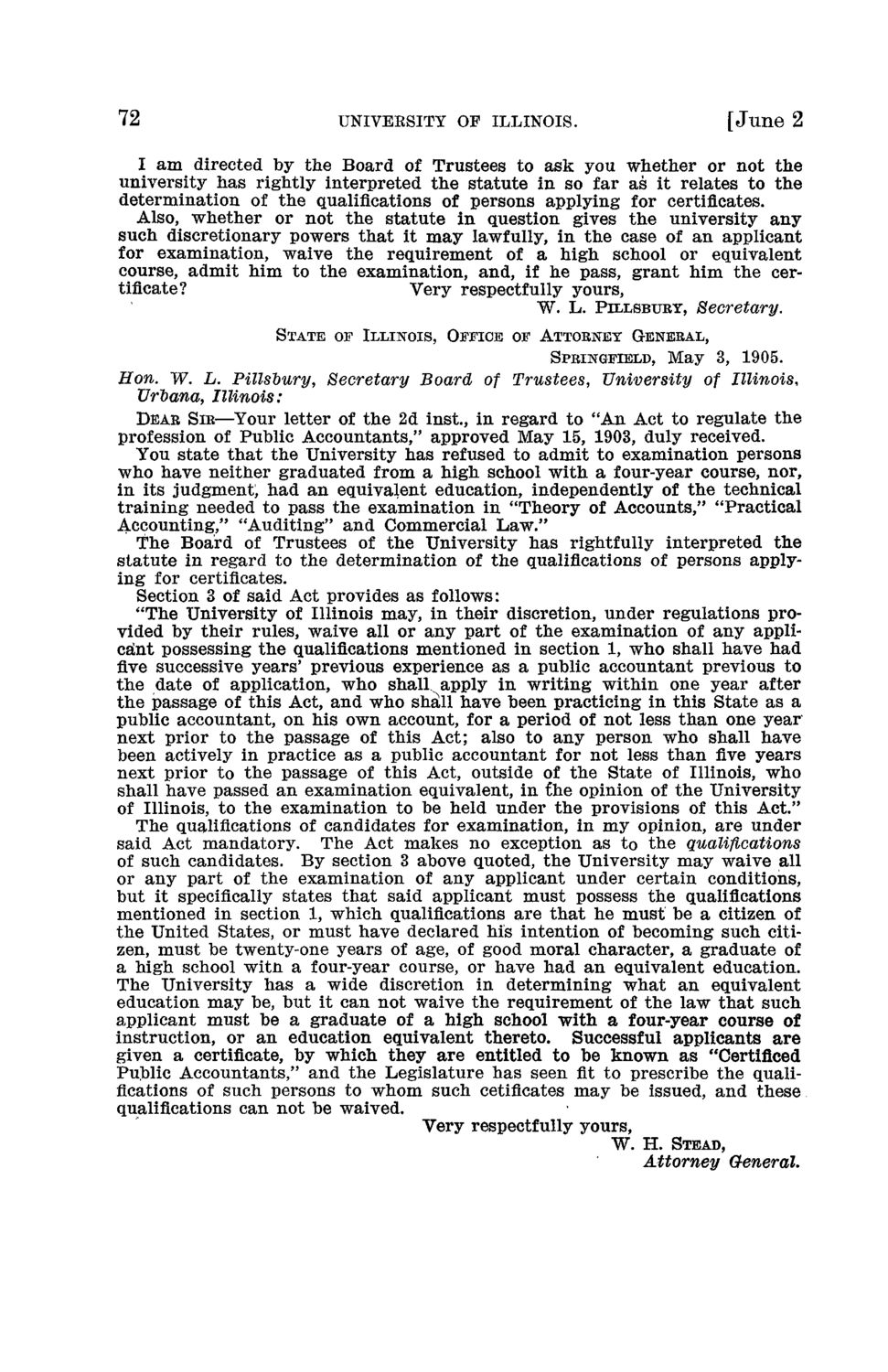| |
| |
Caption: Board of Trustees Minutes - 1906
This is a reduced-resolution page image for fast online browsing.

EXTRACTED TEXT FROM PAGE:
72 UNIVEKSITY OF ILLINOIS. [June 2 I am directed by the Board of Trustees to ask you whether or not the university has rightly interpreted the statute in so far as it relates to the determination of the qualifications of persons applying for certificates. Also, whether or not the statute in question gives the university any such discretionary powers that it may lawfully, in the case of an applicant for examination, waive the requirement of a high school or equivalent course, admit him to the examination, and, if he pass, grant him the certificate? Very respectfully yours, W. L. PLLLSBURY, Secretary. STATE OF ILLINOIS, OFFICE OF ATTORNEY GENERAL, SPRINGFIELD, May 3, 1905. Hon. W. L. Pillsbury, Secretary Board of Trustees, University of Illinois, Urbana, Illinois: DEAR SIR—Your letter of the 2d inst, in regard to "An Act to regulate the profession of Public Accountants," approved May 15, 1903, duly received. You state that the University has refused to admit to examination persons who have neither graduated from a high school with a four-year course, nor, in its judgment, had an equivalent education, independently of the technical training needed to pass the examination in "Theory of Accounts," "Practical Accounting:," "Auditing" and Commercial Law." The Board of Trustees of the University has rightfully interpreted the statute in regard to the determination of the qualifications of persons applying for certificates. Section 3 of said Act provides as follows: "The University of Illinois may, in their discretion, under regulations provided by their rules, waive all or any part of the examination of any applicant possessing the qualifications mentioned in section 1, who shall have had five successive years' previous experience as a public accountant previous to the date of application, who shall apply in writing within one year after the passage of this Act, and who shall have been practicing in this State as a public accountant, on his own account, for a period of not less than one year next prior to the passage of this Act; also to any person who shall have been actively in practice as a public accountant for not less than five years next prior to the passage of this Act, outside of the State of Illinois, who shall have passed an examination equivalent, in £he opinion of the University of Illinois, to the examination to be held under the provisions of this Act." The qualifications of candidates for examination, in my opinion, are under said Act mandatory. The Act makes no exception as to the qualifications of such candidates. By section 3 above quoted, the University may waive all or any part of the examination of any applicant under certain conditions, but it specifically states that said applicant must possess the qualifications mentioned in section 1, which qualifications are that he must be a citizen of the United States, or must have declared his intention of becoming such citizen, must be twenty-one years of age, of good moral character, a graduate of a high school witn a four-year course, or have had an equivalent education. The University has a wide discretion in determining what an equivalent education may be, but it can not waive the requirement of the law that such applicant must be a graduate of a high school with a four-year course of instruction, or an education equivalent thereto. Successful applicants are given a certificate, by which they are entitled to be known as "Certificed Public Accountants," and the Legislature has seen fit to prescribe the qualifications of such persons to whom such cetificates may be issued, and these qualifications can not be waived. Very respectfully yours, W. H. STEAD, Attorney General.
| |